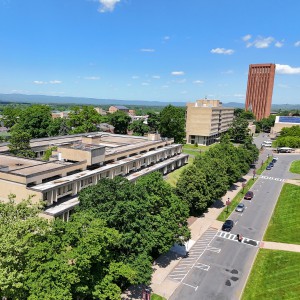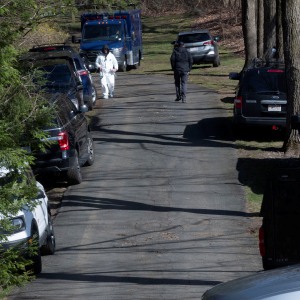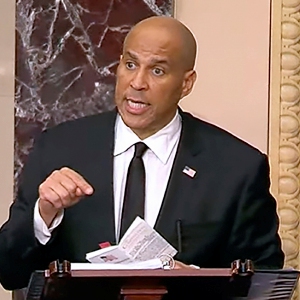Appraisal: Northampton overpaid for Resilience Hub site
| Published: 08-15-2024 4:09 PM |
NORTHAMPTON — An appraisal by a leading real estate brokerage in Boston hired by a group of residents critical of the city’s financial and urban planning policies concludes that Northampton overpaid by as much as $1.5 million for the downtown building that will host its planned Community Resilience Hub.
Mayor Gina-Louise Sciarra, however, stands behind the city’s appraisal and purchase of the former First Baptist Church, noting that the city used a local brokerage who sent representatives to view the site as part of the process.
The most recent appraisal, performed by an agent from the Boston office of Colliers International, a publicly listed company and one of the largest global real estate brokerages, found the estimated value of the building at 298 Main St. is $1.6 million, or about half the $3.1 million the city paid for the property to its previous owner, local real estate mogul Eric Suher.
The Colliers appraisal report also said the initial appraisal of the property, assigned by the city to Bennett Franklin Real Estate of East Longmeadow and done in December 2022, had erred in its valuing the property at $3.3 million.
“The appraisers do not provide a reasoned analysis with good documentation and insight,” the report says, adding that it did not “find the value conclusion to be reliable within a reasonable range.”
The Colliers report said the value of the building was determined in part by looking at other similar sales of nearby or related property, such as the building at 1 King St., which was sold on Sept. 16, 2022 to JPMorgan Chase for $1.3 million, and the former St. John Cantius Church at 10 Hawley St., which sold for $1.2 million on March 16, 2020.
The report is addressed to Rutherford Platt, a professor emeritus of geography at UMass Amherst and a longtime critic of Northampton’s urban planning policies, including the Picture Main Street project — a planned $21 million redesign of the city’s Main Street. In an interview, Platt said he and several other residents, including business owners and people who work in the real estate field, had gotten together to pay for the second appraisal.
“Something just didn’t feel right about this purchase,” Platt said. “A lot of other people were saying the same thing, because there have been other churches in town that have sold for a lot less.”
Article continues after...
Yesterday's Most Read Articles
 Hadley man arrested on firearms, ammunition charges after FBI searches home
Hadley man arrested on firearms, ammunition charges after FBI searches home
 Feds revoking visas, terminating student statuses of four more UMass students, bringing total to 10
Feds revoking visas, terminating student statuses of four more UMass students, bringing total to 10
 Navigating neurodivergence: Mothers open The Neuro Bridge to support children and their families
Navigating neurodivergence: Mothers open The Neuro Bridge to support children and their families
 FBI conducts court-authorized investigation at Hockanum Road home in Hadley
FBI conducts court-authorized investigation at Hockanum Road home in Hadley
 Columnist Olin Rose-Bardawil: Cory Booker speech an authentic American moment
Columnist Olin Rose-Bardawil: Cory Booker speech an authentic American moment
 Area property deed transfers, April 11
Area property deed transfers, April 11
In a statement to the Gazette, Sciarra noted that the Colliers appraisal states that Bennett-Franklin had properly complied with all standards applicable in evaluating the property.
“The city’s appraisal fully complied with all standards applicable to the work,” Sciarra stated. “Following legal procurement requirements, the city proceeded with the acquisition process that included City Council orders.”
Sciarra also noted in her statement that the Colliers agent made the appraisal despite never actually visiting the First Baptist Church building in person, unlike agents from Bennett-Franklin.
“[The] privately paid appraiser may have a different opinion, but it was based on having never actually entered the building they were assessing,” Sciarra said. “It is disheartening that someone would be so against a project that has been years in the making and has engaged and represents the work of so many stakeholders.”
The city’s Bennett-Franklin appraisal includes a copy of an email sent to the real estate company by former Planning & Sustainability director Wayne Feiden formally requesting the appraisal. Dated Nov. 17, 2022, the email indicates that the city had already signed an option to purchase the building from Suher, before having the property appraised.
“We have signed an option to purchase the building for $3.3 million, or to lease it (triple net) for $235,000 per year,” Feiden wrote in the email. “We believe that both prices are below market price based on what we have seen of the market, but we are well aware that our needs are unique.”
The Bennett-Franklin report is dated Dec. 6, 2022. The following day, the city put out a press release officially announcing that it had signed the option to purchase with Suher, an option that was exercised in May 2023.
Furthermore, the Commercial Property Record Card for 298 Main St. from the city’s assessor’s office has the property both assessed and appraised at $1.2 million. The card indicates the valuation is based on a cost approach method, where the value is determined by how much it would cost to build an equivalent structure.
Although the city first announced the deal to buy the building in December 2022 and has since held several public meetings on the Resilience Hub, the purchase came under more scrutiny during last spring’s controversial fiscal 2025 budget discussion that centered around cuts to the school system. Critics of the budget alleged during public comment sessions that the city overspent on the Resilience Hub instead of allocating the extra money to the school district instead.
Criticism has also come from opponents of the city’s Picture Main Street project, which will entail heavy construction on Main Street beginning in 2025, concurrent with the remodeling for the Resilience Hub building.
The money used to purchase the Resilience Hub site largely came from one-time payments and grants, including $1 million from American Rescue Plan Act funds and another $1.4 million in cannabis community impact fees. Money also was provided via Community Development Block Grants and donations from Smith College. The Picture Main Street project is funded by the Massachusetts Department of Transportation.
Once completed, estimated to be sometime in late 2025, the hub is planned to act as a multipurpose center, including as a shelter for the homeless population, and for the community during climate emergencies. It will also provide a regular meeting space and serve as headquarters to several community services. The idea from the hub dates to 2016, following a commissioned study by the city council’s Committee on Community Resources on how to improve the local economy.
Alexander MacDougall can be reached at amacdougall@gazettenet.com.








 Rallygoers: Save Social Security
Rallygoers: Save Social Security ValleyBike to expand its reach with 6-8 new stations and 100 new bikes; Westfield joining program
ValleyBike to expand its reach with 6-8 new stations and 100 new bikes; Westfield joining program  Amherst launches red card campaign for immigrant rights
Amherst launches red card campaign for immigrant rights Most incumbents returning to posts in South Hadley
Most incumbents returning to posts in South Hadley
